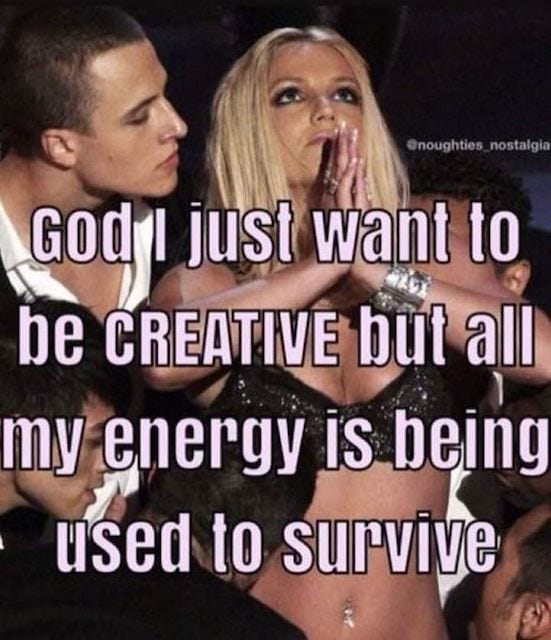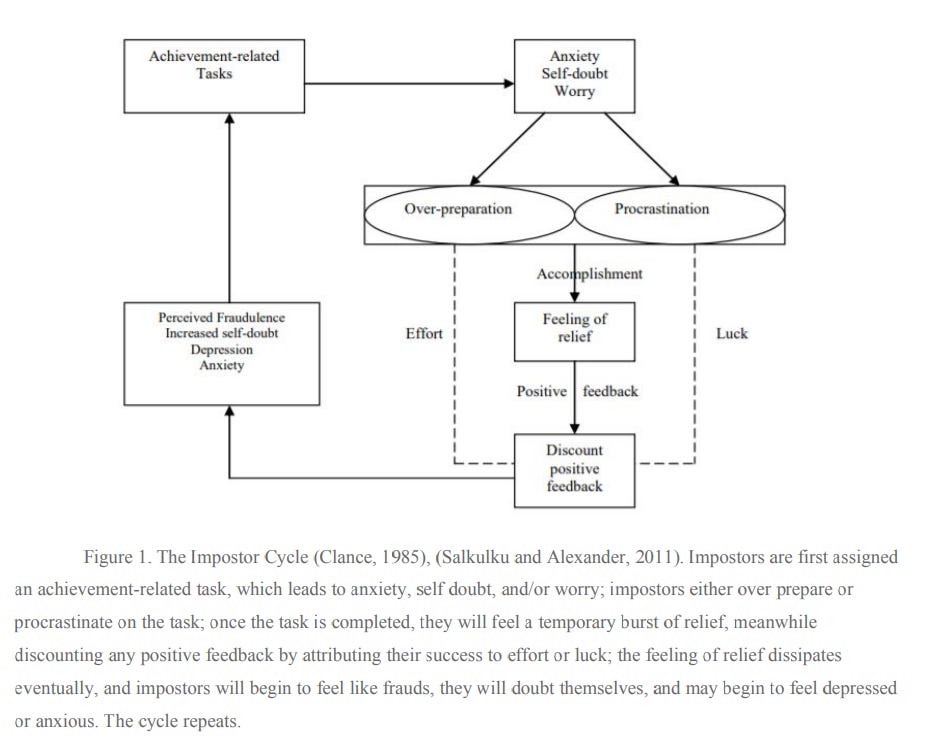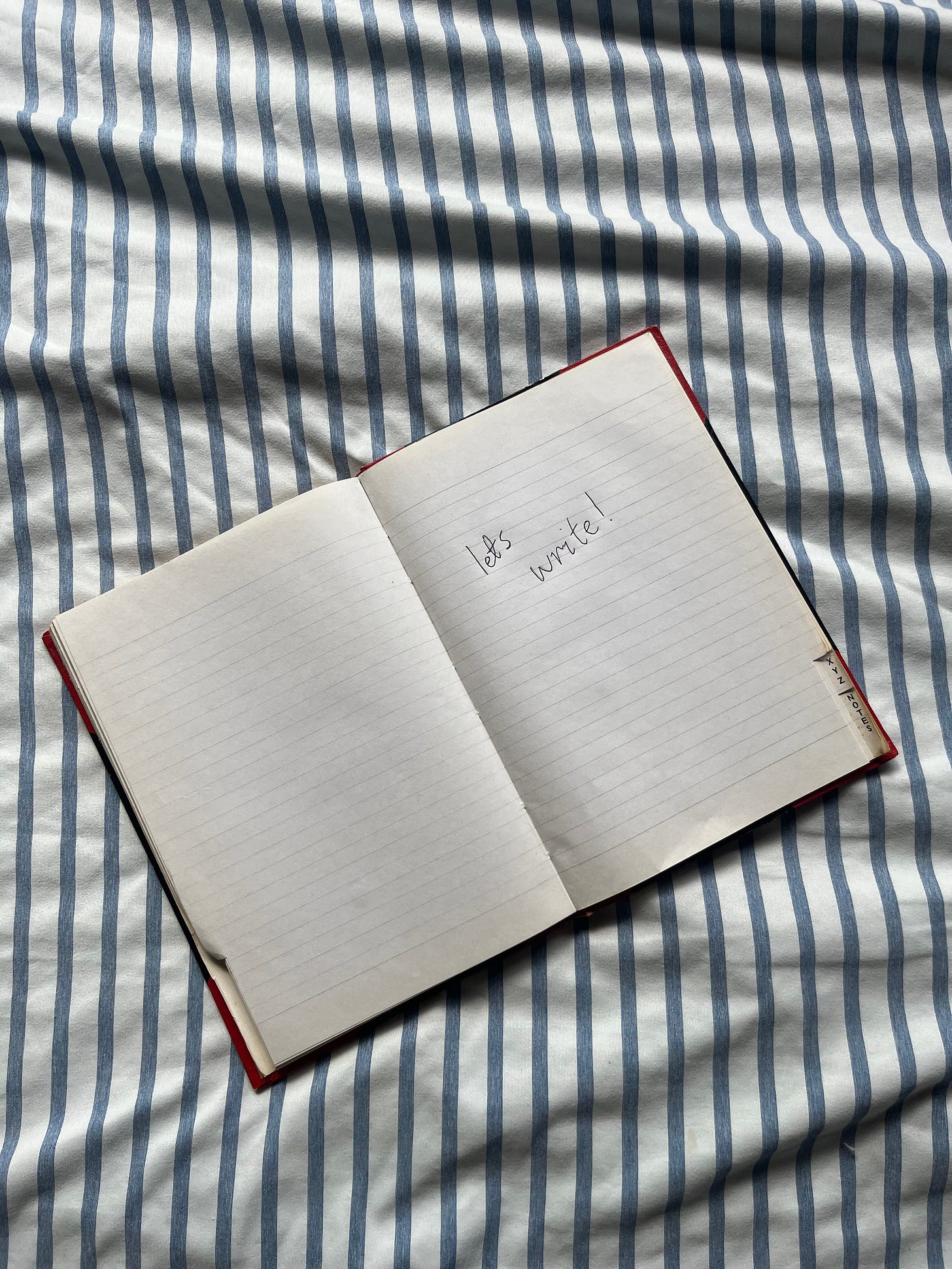Creative Block
The 5000 year history of the phenomena, fancy psychological explanations, and how to tell your inhibitions to fuck off.
Another year has come to an end, and yet again, I’m exhausted. Looking back at 2024, I got a lot done - I wrote over 250 freakin articles for cryin out loud! But yet, while this will sound like the biggest juxtaposition you’ve ever heard, I feel like I’ve let a lot of my creative literary passion wane about unused. I’ve been wanting to freelance and create my own Substack all year. I’ve wanted to indulge in creative writing once again, and reconnect with the 13 year old who would pull all-nighters every weekend to flesh out original characters and plotlines on my first laptop. This is no new self-depreciating thought - my digital footprint contains a similar creative rut article from half a decade ago with the exact same whining.
Ever since reading Madeleine Dore’s I Didn’t Do The Thing Today: Letting Go of Productivity Guilt - which, you guessed it, I read to let go of productivity guilt - I’ve been viewing productivity as a give and take; an absorb and a squeeze. According to Dore, the absorbing or consuming of creative works is needed to inspire us to squeeze out our sponge full of ideas and make a task shiny. But for someone as neurotic and impulsive as myself, I will absorb and absorb and my sponge will sit fat and oversaturated but I still can’t squeeze - what if the squeeze delivers a tonne of dirt onto my plate? Wasted time; sponge so full it’s lost all structural integrity and sits at the back of the garage moulding.
I didn’t particularly like Dore’s book all that much apart from that one kernel of insight, so I decided to look further into the dreaded phenomenon of “creative block”, or “writer’s block” as it’s best known. According to the current literature, my dopamine addicted Gen Z brain is only one of the many generations to experience such shameful turmoil, with my ancestors of 5000 years prior also getting caught up in their heads with their blogs, manifestos, scrolls and hieroglyphs (I’d be scared to write too if I had to physically carve my ideas into stone).
History of Creative Block
Writer’s block became a term to verbalise the phenomena in 1947, coined by Austrian psychiatrist and author Edmund Bergler. A fly attracted to the lit instability and pain that creatives turn into a profession, Bergler would spend a large portion of his career studying the awkward maladjusted lifestyle of the writer, and their “neurotic inhibitions of productivity”. - this being so he could understand why writers were just unable to write, despite evident talent and abundant resources. Alongside his study into writers, Bergler - an avid Freudian - would weave his fame from studies into unconscious masochism (self harm in modern terms), marriage breakdown, and frigidity in women - quite a lovely palette to work with.
Many of the greats of the 20th century - from Franz Kafka, Sylvia Plath, John Steinback, and Virginia Woolfe - all talked of the agony of writers block. Reflecting on his good friend and Breakfast at Tiffany’s writer Truman Capote, Martin Amis admitted that "Capote spent the last 10 years of his life pretending to write a novel that was never there." Capote’s childhood friend and author Harper Lee admitted to a confidant that, following the success of To Kill A Mockingbird, she was struggling to write anything following the pressure of success. Lee wouldn’t publish again for over half a century.
According to journalist and distinguished professor Dr Joyce Kinkead’s recent studies, the first instances of writer’s block have always shared a bed with writing, from as far back as the cuneiform around 3200 BC. If you’re ever feeling alone in your writing drought, just remember writer’s block is literally older than Jesus, and the humble scribes who wrote the official fanfiction ‘The Bible’ probably got stuck trying to find the right syntax for Psalms while hovering a glass of wine to their lips and staring at the structurally questionable ceiling - not much different to you right now, huh?
Intrinsic vs Extrinsic Motivation
One of my biggest takeaways from studying behavioural science for four years was the concept of motivation. It works as the propellor for our flesh-bound lives and leaves us feeling purposeless if we can’t activate it. Motivation can be derived from two threads: intrinsic and extrinsic motivation. Intrinsic motivation is, in my opinion, the best type of motivation to uphold. It is the motivation that comes from within and only within, driven by interest and personal satiation. For children, intrinsic motivation is an abundant source. As kids, we all have dreams to be scientists, vets, and soccer players - purely because we are so enamoured with the idea of spending all day doing what we love to do. As you grow up and tame your active imagination, motivation becomes more extrinsic-based, where your drive is propped up by pursuits of money, status, fame, or maybe being able to make your parents happy (shoutout to fellow eldest daughters out there, its a tough gig but someone has to do it). In a capitalist-individualist society, this extrinsic motivation today manifests itself in grind-culture. The norm is to see money and status as the goal rather than the offshoot.
I think for a lot of creatives, while we have never been known to be an industry of resources abundant, our keen and self-preserving intrinsic motivation is slowly eroding in an online-based and recession-bound environment. “How can I monetize this?” Is a question I often seem to ask myself now, and it takes the fun out of organic creativity. Why would I create for the simple art of discovering myself when I can create to be considered for ad spend?
This was something I found hard about traditional legacy media. Don’t get me wrong, I absolutely adore the companies I have worked for, and I am so lucky to have bylines in the nooks of the internet, but there is something so jarring about being given 30 minutes to churn out an article, especially if it is a puff piece. There is no intrinsic motivation when there is little time. A quote from writer Austin Kleon that always resonated with me is that “creative people need time to just sit around and do nothing.”, which goes against the entire teachings of capitalism. Time is money.
Imposter Syndrome & Perfectionism
And money is for people who “work hard” (I put this in quotations because it’s a LOT more complicated than that).
When it comes to feelings of stagnation in creative fields, minority groups such as BIPOC, working and middle class, and non-AMAB (assigned male at birth) intersect to feel the highest levels of creative block due to Imposter Syndrome, according to a Harvard study.
A really interesting take on Imposter Syndrome can be found from fellow Substacker Thoughts from the Shire, talking about what he refers to as Working Class Imposter Synrome (WCIS):
“It’s not about doubting my achievements—it’s about feeling like those achievements don’t really count, like you’ve slipped into a world that wasn’t meant for you, and it’s only a matter of time before someone notices.”
It toasts to the idea that Imposter Syndrome is a socio-political issue rather than an individual one, as backed up by sociology professor Maddie Breeze. Traditionally, these groups of the population have experienced being blocked from certain achievements, and that weight remains.
Source: Afran et al., 2020. Located here.
When doing a house clean-out recently, I decided to check out my school report cards, and found a quote from grade 3 that still reigns true today:
“Emma consistently maintains neat and orderly bookwork, however, her desire for perfection continues to affect the speed at which she works.” It’s true, because this is the third month I have spent working on the article you’re currently reading.
Funnily enough, I’d say perfectionism is my ball-and-chain, keeping me far from achieving what I probably could have done by now if I’d just taken the courage to start things. Imposter Syndrome is her best friend; the two mean girls who taunt you for reasons you haven’t quite worked out yet (but you somehow choose to trust their judgement).
Perfectionism is also confusing from a creative perspective because the goalposts for what counts as ‘perfect’ are counterintuitive. Van Gogh’s The Starry Night and Canova’s Cupid and Psyche are both world-famous works of art. Still, Van Gogh spent his life broke and unsuccessful, and Canova’s Wiki page for his infamous statue has an entire section dedicated to criticisms. Much art goes through the transformative lens of loved to hated and vice versa, and perfect art would go against the meaning of art in itself.
But then again, perfectionism goes hand in hand with our maladaptive extrinsic motivation, pushing us to the brink of exhaustion, doing, undoing, and redoing our art (and ourselves) to please others. One of my all-time heroes David Byrne sums it up better than I ever could in the critique book on his art form of choice, How Music Works:
“The act of making music, clothes, art, or even food has a very different, and possibly more beneficial effect on us than simply consuming those things. And yet for a very long time, the attitude of the state toward teaching and funding the arts has been in direct opposition to fostering creativity among the general population. It can often seem that those in power don’t want us to enjoy making things for ourselves—they’d prefer to establish a cultural hierarchy that devalues our amateur efforts and encourages consumption rather than creation. This might sound like I believe there is some vast conspiracy at work, which I don’t, but the situation we find ourselves in is effectively the same as if there were one.
The way we are taught about music, and the way it’s socially and economically positioned, affect whether it’s integrated (or not) into our lives, and even what kind of music might come into existence in the future. Capitalism tends toward the creation of passive consumers, and in many ways this tendency is counterproductive.”
- David Byrne, How Music Works (2012)
Nothing’s New
There was an occasion last year, when someone very near and dear to me holed themselves up in their room, trying to write scores for film and TV. This person would spend hours and hours fiddling with their guitar on a normal day, so to declare a whole chunk of time just to this creative pursuit could have only provided a phenomenal amount of chords, peddles, and frustration. By day three of their brainstorming, I received a text. “I’ve got it!”, only to realise soon after that their epiphany was an already-existing Beatles song.
There are often times when it feels like we’ve reached the end of our imaginative tether in modern-day society, as we sit crowded with all our remakes and adaptations. There have often been times I have found scribbles in my notes app of potential story plots, only to realise that a Disney movie already covered it a decade or more ago. It’s beyond frustrating to find your niche when it feels like everything already exists. Are we finite, or just stagnant?
This problem isn’t discriminatory - we are all humans processing life for the first time, like our forebearers who made art before us. I think this is something I constantly try to remind myself. If creativity was so fixed, we would have evolved past such human novelties as heartbreak and mistakes. We’d all be shiny and robotic - like AI. How boring.
It sometimes feels - with algorithms, AI and the new-Gen problem of being “constantly on” - that there is so much ‘New’ all the time, and it feels hedonistic to provide our own takes. In the age of irony, there is nothing our consumable generation needs more than something real and chewable and organic. Creative block shows that you are choosing to sit with your art which should be admired!
Just remember to give others the chance to sit with it too.
Source: My journal.
Thanks for reading! I got so invested in researching this topic that I could have gone on and on for a lot longer. I tried my best to keep it short but not abrupt, I’m hoping this is reflected in what you read. Don’t worry though, I will be writing a Part 2 shortly to address overcoming creative block - there’s nothing I hate more than people who dump you with problems and give you no solutions.
In the meantime, please leave a comment and tell me your thoughts. I’d love to see some new perspectives, experiences, and even discourse on this awful phenomenon. Let’s stay in touch xx
Cheers,
Em






